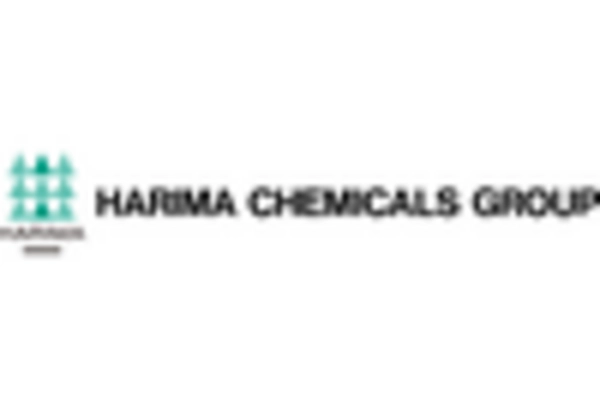Technological Innovations
Technological innovations play a crucial role in shaping the Pine Chemicals Market. Advances in extraction and processing technologies have enhanced the efficiency and yield of pine chemical production. For instance, new methods for extracting terpenes and rosin from pine trees have emerged, allowing for higher purity and better performance in applications. This has led to an increase in the adoption of pine chemicals in various sectors, including food and beverage, where natural additives are preferred. Furthermore, the integration of automation and digital technologies in production processes is expected to streamline operations and reduce costs. As these innovations continue to evolve, they are likely to create new opportunities for growth within the pine chemicals market.
Sustainability Initiatives
The Pine Chemicals Market is increasingly influenced by sustainability initiatives. As consumers and businesses alike prioritize eco-friendly products, the demand for renewable resources has surged. Pine chemicals, derived from pine trees, are naturally biodegradable and offer a sustainable alternative to petroleum-based chemicals. This shift towards sustainability is reflected in market data, indicating a projected growth rate of approximately 5% annually in the pine chemicals sector. Companies are investing in sustainable sourcing and production methods, which not only meet regulatory requirements but also appeal to environmentally conscious consumers. This trend is likely to drive innovation and expand the market for pine chemicals, as industries seek to reduce their carbon footprint and enhance their sustainability profiles.
Regulatory Support and Standards
The Pine Chemicals Market is significantly influenced by regulatory support and standards aimed at promoting the use of renewable resources. Governments are increasingly implementing policies that encourage the adoption of bio-based chemicals, including pine chemicals. This regulatory environment is fostering investment in research and development, as companies seek to comply with stringent environmental regulations. Market data indicates that regions with supportive policies are witnessing faster growth in the pine chemicals sector, as businesses are incentivized to transition from traditional petrochemical sources. This regulatory backing not only enhances market stability but also encourages innovation, positioning the pine chemicals market for sustained growth in the coming years.
Rising Demand in End-User Industries
The Pine Chemicals Market is experiencing a notable increase in demand from various end-user industries, including adhesives, paints, and personal care products. The adhesives segment, in particular, is projected to account for a significant share of the market, driven by the construction and automotive sectors. Market data suggests that the adhesives segment alone could grow at a rate of 6% over the next few years. Additionally, the personal care industry is increasingly incorporating pine chemicals due to their natural properties and effectiveness. This rising demand across diverse applications is likely to bolster the overall growth of the pine chemicals market, as manufacturers adapt to meet the evolving needs of these industries.
Consumer Preference for Natural Products
The Pine Chemicals Market is witnessing a shift in consumer preferences towards natural and organic products. As awareness of health and environmental issues grows, consumers are increasingly seeking products that are free from synthetic chemicals. Pine chemicals, known for their natural origin and beneficial properties, are becoming a preferred choice in various applications, including cosmetics and household products. This trend is supported by market data showing a rise in the sales of natural personal care products, which is expected to continue growing at a rate of 7% annually. As manufacturers respond to this demand by incorporating pine chemicals into their formulations, the market is likely to expand, driven by the increasing consumer inclination towards natural alternatives.


















Leave a Comment